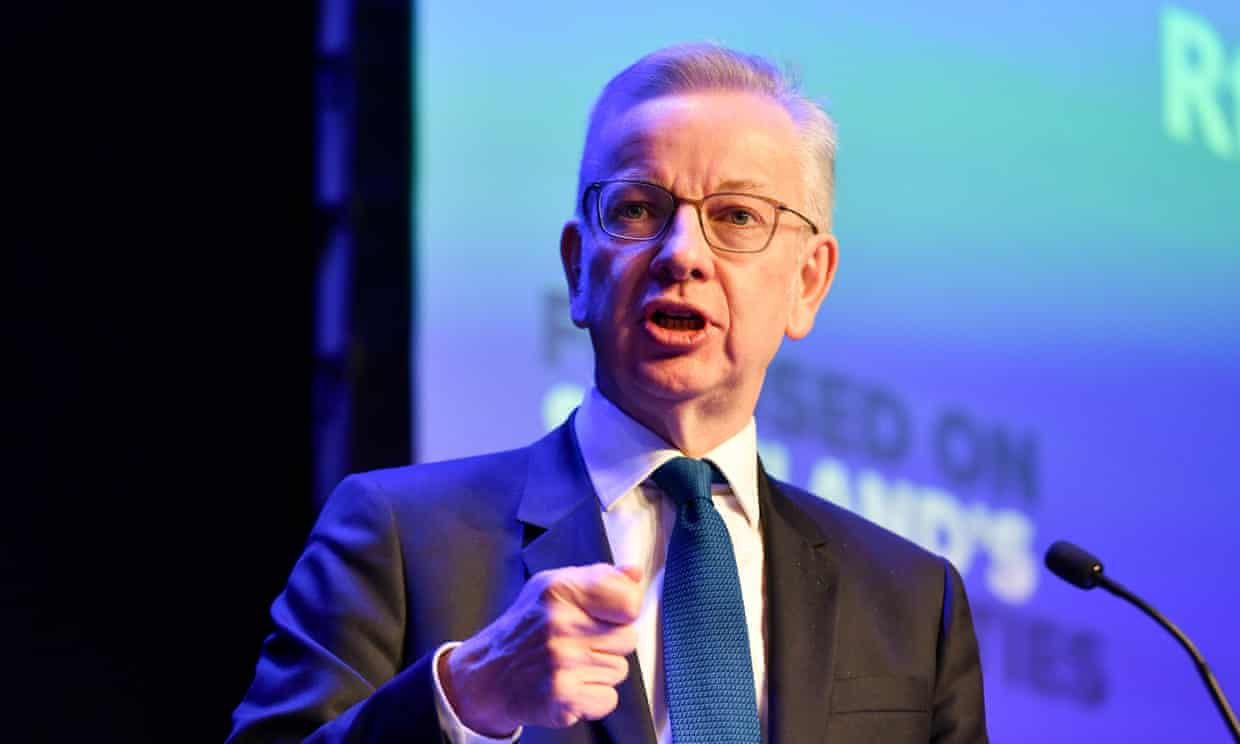The communities secretary wants ‘trailblazer’ government departments to pilot a scheme to ban individuals and groups deemed extremist from public life
Organisations and individuals that breach a new official definition of extremism will be excluded from meetings or any engagement with ministers, senior civil servants, government advisory boards and funding.
Councils will be expected to follow the government’s lead, cutting any financial ties or support to individuals or groups that have been categorised as extremist.
The proposed new definition of extremism – first revealed by the Observer in November – says “core behaviours” that could constitute extremism include attempts to “overturn, exploit or undermine the UK’s system of liberal democracy to confer advantages or disadvantages on specific groups” or threatening individual rights or enabling the spread of extremism.
In internal briefing papers, Gove’s officials admit there is a risk of a legal challenge. Gove already faces strong opposition to the plans, including from civil liberties groups, officials and some senior Tory MPs.
“The government wants to launch this without a public consultation on the definition, or proper engagement with faith leaders,” said one official who has seen the proposals. “It’s never going to work.”
New measures to target groups defined as extremist by the government are part of Rishi Sunak’s drive to crack down on Islamist extremists and far-right groups.
He warned in a speech outside No 10 on 1 March of streets that had been “hijacked by small groups” and protests that had descended into “intimidation, threats, and planned actions of violence”.
Civil liberties groups are concerned it could brand legitimate organisations and individuals as extremists, suppressing freedom of speech.
Some Tory MPs also fear that it could be used to ban socially conservative groups – for example, those that oppose same-sex marriage or abortion.
“Refusing to engage with groups it disagrees with is becoming a pattern of behaviour from this government,” said Akiko Hart, director of Liberty.
“It’s vital those in power do not silence the people set to be most affected by its policies.”
The vetting scheme for the new policy has not yet been established. The briefing documents suggest that “trailblazer” departments will pilot the scheme. It is expected that the vetting units will check individuals and groups under new standards, which include demonstrating “any of the behaviours set out in the 2024 definition of extremism”.
The documents circulated by the Department for Levelling Up, Housing and Communities warn: “There are some risks to this approach, including greater risk of legal challenge if we publish the principles without the due diligence system being operational.”
Robin Simcox, the government’s commissioner for countering extremism, suggested in an article in the Telegraph last week that London should no longer be permitted “to be turned into a no-go zone for Jews every weekend”, referring to the regular pro-Palestinian marches.
An official at the Board of Deputies of British Jews told the Times that while many British Jews felt unsafe in central London during the marches, he was not “particularly comfortable with the language of ‘no-go zones’.”
In 2011, the government’s Prevent strategy defined extremism as the “active opposition to fundamental British values, including democracy, the rule of law, individual liberty and the mutual respect and tolerance of different faiths and beliefs”.
The government proposed a bill in 2016 to “tackle the menace of extremism”, but it was shelved after the government failed to provide a legally acceptable definition of extremism.
Alex Carlile, a crossbench peer and former independent reviewer of terrorism legislation, said there was a risk in proposing a new definition.
He said: “A good definition would ensure a greater level of consistency in the way in which, for example, the policing of demonstrations takes place. If it is not a good definition, we risk making things worse.”
Lord Carlile said he did not consider a new definition was necessary because there were laws already in place to deal with extremist groups, but more guidance for police forces in dealing with extremist groups would be helpful.
The initial documents identified eight groups that could be captured by a proposed new definition of extremism, including the Muslim Council of Britain (MCB) and Palestine Action.
The MCB would be captured on “historical” grounds, according to the internal documents, and for refusing to “repudiate or rescind past behaviours”, and for its association with those who have demonstrated extremist behaviours, without providing critical challenge.
The government has not confirmed whether it will identify specific groups when it launches the new extremism definition. It faces the risk of a legal challenge in banning individuals and organisations from funding and engagement with public bodies, based on a definition that is not enshrined in law.
A MCB spokesperson said: “Extremism and terrorism are serious matters that require real leadership and not cynical electioneering. To suggest that the Muslim Council of Britain would fall under arbitrary definitions of extremism is offensive, ludicrous and dangerous.
“We are a democratic organisation representing a cross-section of British Muslims. After standing accused of peddling Islamophobia, it is ironic that the governing party should lash out and accuse everyone else but themselves of extremism. We shall be monitoring developments and will seek to reserve our position legally.”
Palestine Action said no new definition would deter it from campaigning.
A government spokesperson said:“We are taking action to ensure that no extremist organisations or individuals are being given a platform by their actions and interactions with government. We will set out further details shortly.”
